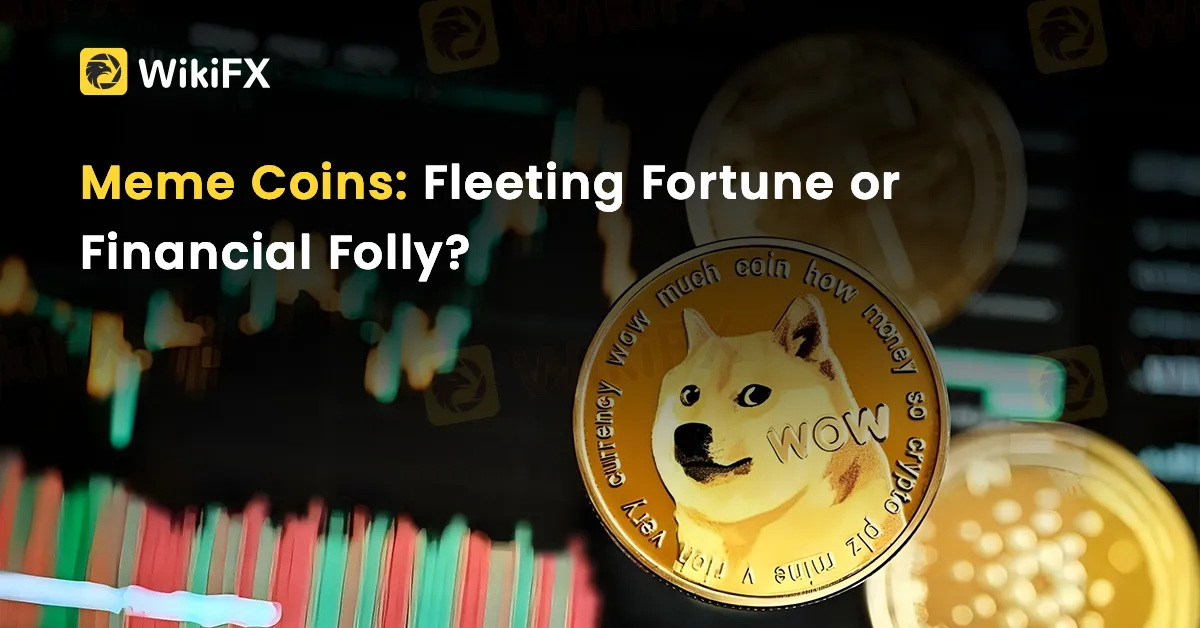简体中文
繁體中文
English
Pусский
日本語
ภาษาไทย
Tiếng Việt
Bahasa Indonesia
Español
हिन्दी
Filippiiniläinen
Français
Deutsch
Português
Türkçe
한국어
العربية
Meme Coins: Fleeting Fortune or Financial Folly?
Abstract:Meme coins like Dogecoin, Shiba Inu, and Pepecoin have captured headlines and social media feeds, turning early adopters into overnight millionaires. However, beneath their whimsical branding and viral appeal lies a critical question: Are meme coins a legitimate investment or a financial house of cards?

In the age of digital assets, meme coins have emerged as the mavericks of the cryptocurrency market. Tokens like Dogecoin, Shiba Inu, and Pepecoin have captured headlines and social media feeds, turning early adopters into overnight millionaires. However, beneath their whimsical branding and viral appeal lies a critical question: Are meme coins a legitimate investment or a financial house of cards?
Meme coins thrive on internet culture, propelled by celebrity endorsements, community hype, and, more recently, a retail investor base hungry for the next big thing. Their low entry price and potential for meteoric rises make them particularly attractive to novice investors. After all, who wouldnt want to transform a modest investment into life-changing wealth?
But herein lies the problem: this appeal often fosters an environment where FOMO (fear of missing out) eclipses rational investment strategies. Many traders dive headfirst into these assets, lured by promises of quick returns, without fully understanding what they are buying.

Unlike blue-chip cryptocurrencies such as Bitcoin or Ethereum, which offer real-world applications and robust networks, meme coins are frequently devoid of intrinsic value. They are not backed by tangible assets, nor do they possess unique technological advantages. Instead, their value hinges largely on speculative trading and the whims of online communities.
This lack of fundamentals renders meme coins particularly susceptible to extreme volatility. Price surges can vanish as quickly as they appear, often leaving latecomers nursing significant losses. Additionally, many meme coins operate in an unregulated space, further exposing investors to risks such as fraud, pump-and-dump schemes, and sudden liquidity crashes.
The most pressing concern with meme coins is their reliance on hype. While a strong community can indeed drive growth, it also means that these assets are precariously tied to the fleeting nature of internet trends. Once the buzz fades or shifts to another coin, the value can plummet, leaving investors holding depreciating assets.
Another risk is the lack of transparency and development oversight. Some meme coins are created as jokes or social experiments, with developers maintaining limited accountability. Others have questionable tokenomics, with large portions of supply held by a few wallets, enabling price manipulation.
For traders enticed by the thrill of meme coins, the key takeaway is clear: exercise caution. Investing in any asset requires thorough research, and meme coins are no exception. Evaluate the projects whitepaper, assess its community engagement, and scrutinise its token distribution. Above all, understand that high risk is often paired with high reward—and the latter is never guaranteed.
Meme coins may be a product of the times, reflecting a broader trend of retail investors seeking to disrupt traditional markets. However, their speculative nature makes them an unreliable foundation for long-term financial planning. As traders, the responsibility lies in ensuring that each investment aligns with sound principles and clear understanding.
In conclusion, meme coins can be a thrilling gamble, but they are not a substitute for strategic investing. As the old adage goes: Never invest in something you dont understand. In a market as dynamic and unpredictable as cryptocurrency, this wisdom is more relevant than ever.

Disclaimer:
The views in this article only represent the author's personal views, and do not constitute investment advice on this platform. This platform does not guarantee the accuracy, completeness and timeliness of the information in the article, and will not be liable for any loss caused by the use of or reliance on the information in the article.
Read more

European Crypto Market Shakeup: Banking Limits, Regulatory Pressures, and Exchange Survival
Portugal’s BiG bank blocks fiat transfers to crypto platforms. European crypto platforms face mounting challenges amid regulatory changes.

Why Cryptocurrency is the Digital Gold of the 21st Century
Cryptocurrency is often dubbed the "digital gold" of the 21st century. Learn why this comparison is more than a catchy phrase and how digital currencies mirror gold's value.

Coinbase to Delist USDT, PYUSD and Other Stablecoins by Dec. 13
Coinbase Europe will delist USDT, PYUSD, and other stablecoins as part of MiCA's new regulations. Affects crypto users and exchanges in Europe ahead of the compliance deadline.

Coinbase Plans Expansion in the Philippines to Boost Crypto Growth
Coinbase plans to expand in the Philippines, aiming to increase crypto adoption and grow the blockchain economy with a new country manager.
WikiFX Broker
Latest News
Good News Malaysia: Ready for 5% GDP Growth in 2025!
How to Automate Forex and Crypto Trading for Better Profits
Is the stronger dollar a threat to oil prices?
Rising Risk of Japan Intervening in the Yen's Exchange Rate
How Far Will the Bond Market Decline?
U.S. to Auction $6.5 Billion in Bitcoin in 2025
Standard Chartered Secures EU Crypto License in Luxembourg
Trading Lessons Inspired by Squid Game
Is Infinox a Safe Broker?
How Did the Dollar Become the "Dominant Currency"?
Currency Calculator






